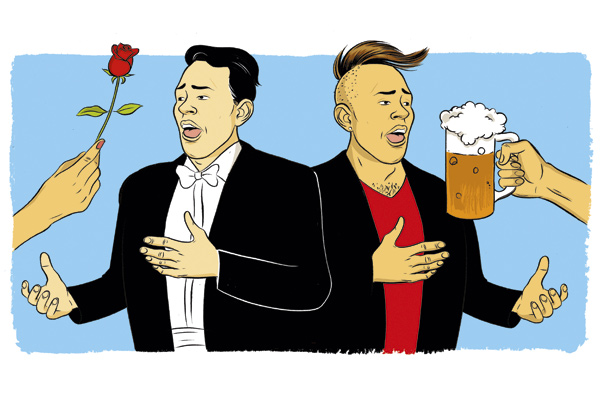How do you solve a problem like Lucia? Murder, madness, abuse, possibly even incest, all set to a soundtrack of rollicking, rum-ti-tum tunes. Add to that a Scottish setting (nothing sabotages dramatic seriousness quite like a kilt, just ask Mel Gibson) and you have Gilbert & Sullivan in an Italian accent, Ruddigore with a cigarette and a suntan.
Recently at the Royal Opera House Katie Mitchell tried to naturalise Donizetti’s opera into submission, but ended up tussling with a score she clearly didn’t trust and a cast who didn’t seem to trust her, giving her audience what she wanted Lucia to be, rather than what’s actually there. Returning, after that, to David Alden’s English National Opera production (premièred in 2008, and last revived in 2010) feels like coming home.
That Alden’s is ENO’s first ever production says a lot about the piece, or at least how it is perceived. In the unspoken division of repertoire, Lucia belongs up the road at Covent Garden; it’s a star vehicle — a great role (and an even greater scene) with an opera attached. Freed from that conviction, and from any tricksy international divas who might object to being asked to act as well as sing, the opera becomes a different creature. Blowsy gothic baronial is out, and in its place we have psychological horror, where the real villains are not those who spatter blood, but those who chill it.
Cutting through the politics of the work’s original 18th-century setting, Alden brings his gaze in close for a Victorian domestic drama. The battle here is not between Hanoverian and Jacobite, nor even between men and women, but between what seems and what is — between the pretty fiction and the squalid truth, the public face and the private body. Just as Donizetti’s score paints a grinning face on grief and violence, so Alden’s blank-faced matrons and bewhiskered patriarchs — even the chaplain Raimondo — avert their gaze from the horrors of Lucia’s forced marriage, clinging to a propriety that is all they have left in designer Charles Edwards’s mouldering shell of a Ravenswood.
An empty theatre and a nursery full of ghosts are all that remain of a once-great estate. Just a single iron bedstead remains in this barren institution, home to a girl who cannot grow up — an Alice trapped for ever in Wonderland. This doll-like creature becomes a human stage for the desires and agendas of those around her — manhandled, bullied, abused, defiled.
It’s a beautifully crafted frame, but one that relies on a cast capable of filling it. In soprano Sarah Tynan (making her role debut here) Alden has a mesmerising heroine. A smaller voice denies her some of the role’s technical tricks and colours, which we scarcely miss thanks to the precision of her delivery. Is it too beautiful, too controlled in the mad scene, where she eschews the traditional Melba cadenza for something more exploratory? Possibly. But it’s the tiniest of quibbles, and it’s an exquisite accuracy that offers the perfect foil to the thrilling, thuggish force of Lester Lynch’s self-loathing abuser of an Enrico — occasionally vocally wayward, but always powerful. Can somebody please book him to sing some Verdi in the UK?
Like Tynan’s Lucia, Eleazar Rodriguez’s Edgardo is small and perfectly formed, wringing (and ringing) every ounce of character from a cardboard hero with his glossy tenor — varnished mahogany to Michael Colvin’s deliciously pine-brittle Arturo. Some ensemble smudges aside, Stuart Stratford holds the whole together in careful, muted balance, his Halloween horror story written in sinister sepia rather than blood.
From muted understatement to baroque excess at the Barbican. There’s a reason everyone from Joyce DiDonato onwards wants to work with period ensemble Il Pomo d’Oro. Under its precocious chief conductor, Maxim Emelyanychev, the group’s signature style — swift speeds, crunchy textures and explosive articulation — has only become more so. It’s an approach alive to drama and rhetoric, well suited to the quick-fire tragicomedy of Handel’s Serse.
The opera’s tonal ambiguities may not have suited an 18th-century audience, but its opera seria send-up plays well today, especially with so skilled a cast of specialists and Emelyanychev himself, smuggling humour into his continuo playing like a schoolboy with a catapult in his pocket. A concert framework barely dulled the drama, which is really all in the music anyway —Francesca Aspromonte’s flighty coloratura and pouting trills, Inga Kalna’s silken legato and sober delivery painting a vivid picture of Handel’s two rival sisters, with Vivica Genaux irresistible as the object of both their affections.
But Serse is all about its self-dramatising man-child of a king — who, incidentally, isn’t really asking us to admire the beauty of a plane tree in his famous opening aria, so much as the beauty of himself admiring it — and countertenor Franco Fagioli never once let us forget that. Bedecking and bedizening his arias with more ornaments than a royal mistress, leaping over octaves with insouciant ease and generally running amok, he gave us glorious vulgarity and the audience loved it. Bring on Agrippina next May.






Comments